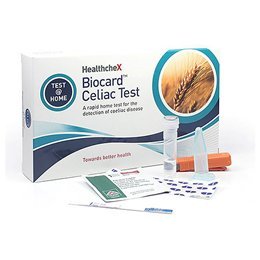Coeliac Testing
You’ll find a chapter dedicated to the testing (and diagnosis) procedure for coeliac disease in my book, Coeliac Disease: what you need to know, although there is a summary on the Coeliac UK website.
 There are now home testing kits available, and my understanding of these is that they are very good, have been endorsed by some gastroenterologists, and are just as accurate as those tests available from your doctor. It is vital, though, that you discuss results with your medical practitioner if you go down this route – a biopsy will probably still be needed to confirm a diagnosis – and you should also see your doctor too if symptoms persist even if the test is negative.
There are now home testing kits available, and my understanding of these is that they are very good, have been endorsed by some gastroenterologists, and are just as accurate as those tests available from your doctor. It is vital, though, that you discuss results with your medical practitioner if you go down this route – a biopsy will probably still be needed to confirm a diagnosis – and you should also see your doctor too if symptoms persist even if the test is negative.
Two that I’m aware of are the Biocard Celiac Test (right) and the GlutenCheck Gluten Intolerance Test.
IgG Testing (Food Intolerance)
A popular method of alternative testing, not available via the health service, which measures IgG antibodies to foods in the blood, and recommends dietary manipulation with the aim of symptomatic improvement – essentially by excluding for varying periods foods to which IgG levels are raised.
The Whorwell trial of 2004, published in Gut, found that “food elimination based on IgG antibodies may be effective in reducing IBS symptoms and is worthy of further biomedical research”. The highly respected Professor John Hunter of Addenbrooke’s in Cambridge wrote an open letter in the BMJ explaining why he thought the case for IgG remains “doubtful” and the authors of the original paper acknowledged in their comment response that IgG measurements “may not be relevant in food intolerance in general”. In relation to IBS, this Norwegian study has very recently disputed the link with regard to IgG.
This small Italian study from 2011 suggests IgG4 testing ‘lacks clinical utility’ for food intolerance in relation to skin sensitivities.
This Dutch abstract from the EAACI Task Force Report found that IgG indicates exposure and tolerance, rather than intolerance.
The Australian Society of Clinical Immunology and Allergy is worth quoting at length:
“IgG antibodies to food are commonly detectable in healthy adult patients and children, independent of the presence of absence of food-related symptoms. There is no credible evidence that measuring IgG antibodies is useful for diagnosing food allergy or intolerance, nor that IgG antibodies cause symptoms. In fact, IgG antibodies reflect exposure to allergen but not the presence of disease. The exception is that gliadin IgG antibodies are sometimes useful in monitoring adherence to a gluten-free diet patients with histologically confirmed coeliac disease… Despite studies showing the uselessness of this technique, it continues to be promoted in the community, even for diagnosing disorders for which no evidence of immune system involvement exists.”
Another recent paper, this in the Journal of Gastroenterology and Hepatology, states that “the measurement of specific IgG in serum may be unreliable and the level of evidence of the efficacy of exclusion diets is limited, treatment based on “abnormally” high antibodies cannot be recommended.”
Further, the House of Lords’ Select Committee on Science and Technology reported that “the IgG food antibody test is being used to diagnose food intolerance in the absence of stringent scientific evidence” (see 8.35 to 8.40 for more interesting findings.)
YorkTest Laboratories, incidentally, a leading provider of IgG testing, have fallen foul of the ASA.